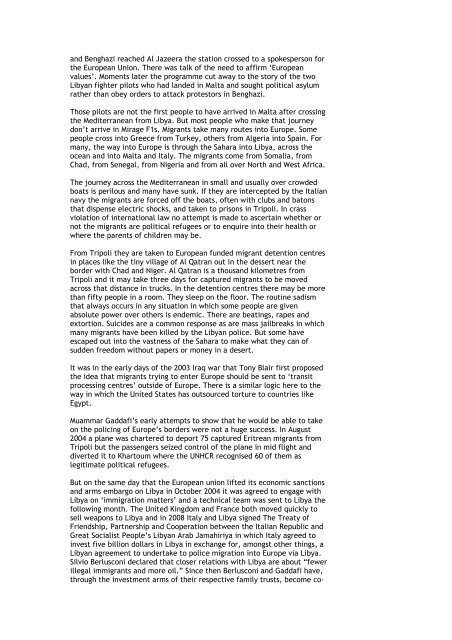April 2011 - Centre for Civil Society - University of KwaZulu-Natal
April 2011 - Centre for Civil Society - University of KwaZulu-Natal
April 2011 - Centre for Civil Society - University of KwaZulu-Natal
You also want an ePaper? Increase the reach of your titles
YUMPU automatically turns print PDFs into web optimized ePapers that Google loves.
and Benghazi reached Al Jazeera the station crossed to a spokesperson <strong>for</strong><br />
the European Union. There was talk <strong>of</strong> the need to affirm ‘European<br />
values’. Moments later the programme cut away to the story <strong>of</strong> the two<br />
Libyan fighter pilots who had landed in Malta and sought political asylum<br />
rather than obey orders to attack protestors in Benghazi.<br />
Those pilots are not the first people to have arrived in Malta after crossing<br />
the Mediterranean from Libya. But most people who make that journey<br />
don’t arrive in Mirage F1s. Migrants take many routes into Europe. Some<br />
people cross into Greece from Turkey, others from Algeria into Spain. For<br />
many, the way into Europe is through the Sahara into Libya, across the<br />
ocean and into Malta and Italy. The migrants come from Somalia, from<br />
Chad, from Senegal, from Nigeria and from all over North and West Africa.<br />
The journey across the Mediterranean in small and usually over crowded<br />
boats is perilous and many have sunk. If they are intercepted by the Italian<br />
navy the migrants are <strong>for</strong>ced <strong>of</strong>f the boats, <strong>of</strong>ten with clubs and batons<br />
that dispense electric shocks, and taken to prisons in Tripoli. In crass<br />
violation <strong>of</strong> international law no attempt is made to ascertain whether or<br />
not the migrants are political refugees or to enquire into their health or<br />
where the parents <strong>of</strong> children may be.<br />
From Tripoli they are taken to European funded migrant detention centres<br />
in places like the tiny village <strong>of</strong> Al Qatran out in the dessert near the<br />
border with Chad and Niger. Al Qatran is a thousand kilometres from<br />
Tripoli and it may take three days <strong>for</strong> captured migrants to be moved<br />
across that distance in trucks. In the detention centres there may be more<br />
than fifty people in a room. They sleep on the floor. The routine sadism<br />
that always occurs in any situation in which some people are given<br />
absolute power over others is endemic. There are beatings, rapes and<br />
extortion. Suicides are a common response as are mass jailbreaks in which<br />
many migrants have been killed by the Libyan police. But some have<br />
escaped out into the vastness <strong>of</strong> the Sahara to make what they can <strong>of</strong><br />
sudden freedom without papers or money in a desert.<br />
It was in the early days <strong>of</strong> the 2003 Iraq war that Tony Blair first proposed<br />
the idea that migrants trying to enter Europe should be sent to ‘transit<br />
processing centres’ outside <strong>of</strong> Europe. There is a similar logic here to the<br />
way in which the United States has outsourced torture to countries like<br />
Egypt.<br />
Muammar Gaddafi’s early attempts to show that he would be able to take<br />
on the policing <strong>of</strong> Europe’s borders were not a huge success. In August<br />
2004 a plane was chartered to deport 75 captured Eritrean migrants from<br />
Tripoli but the passengers seized control <strong>of</strong> the plane in mid flight and<br />
diverted it to Khartoum where the UNHCR recognised 60 <strong>of</strong> them as<br />
legitimate political refugees.<br />
But on the same day that the European union lifted its economic sanctions<br />
and arms embargo on Libya in October 2004 it was agreed to engage with<br />
Libya on ‘immigration matters’ and a technical team was sent to Libya the<br />
following month. The United Kingdom and France both moved quickly to<br />
sell weapons to Libya and in 2008 Italy and Libya signed The Treaty <strong>of</strong><br />
Friendship, Partnership and Cooperation between the Italian Republic and<br />
Great Socialist People’s Libyan Arab Jamahiriya in which Italy agreed to<br />
invest five billion dollars in Libya in exchange <strong>for</strong>, amongst other things, a<br />
Libyan agreement to undertake to police migration into Europe via Libya.<br />
Silvio Berlusconi declared that closer relations with Libya are about “fewer<br />
illegal immigrants and more oil.” Since then Berlusconi and Gaddafi have,<br />
through the investment arms <strong>of</strong> their respective family trusts, become co-
















